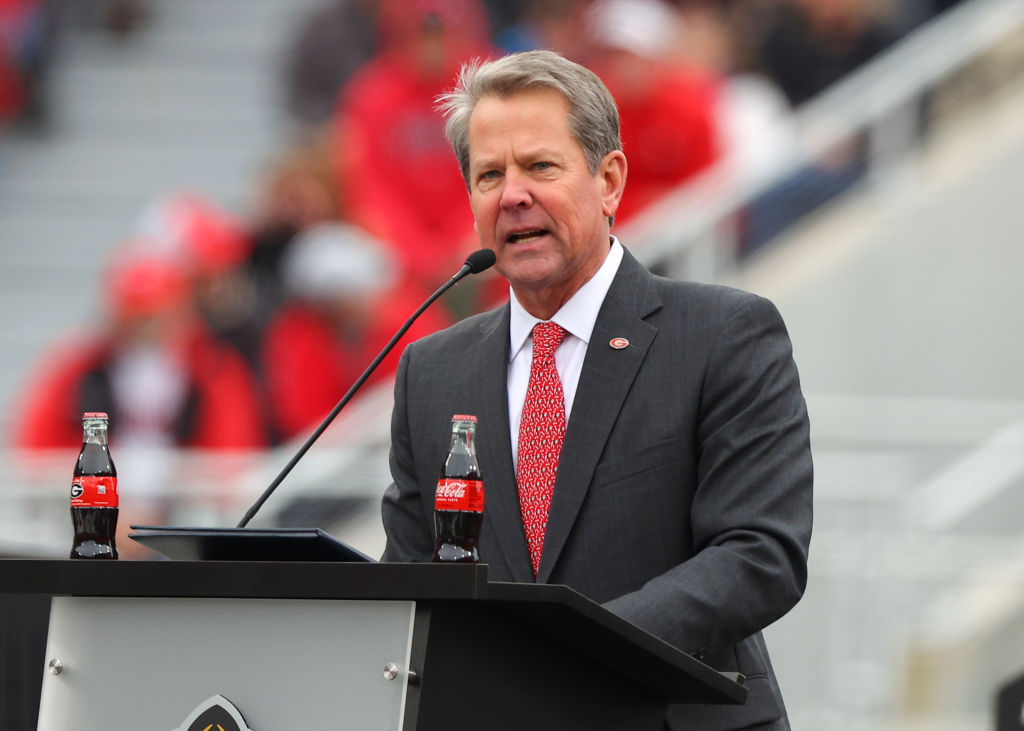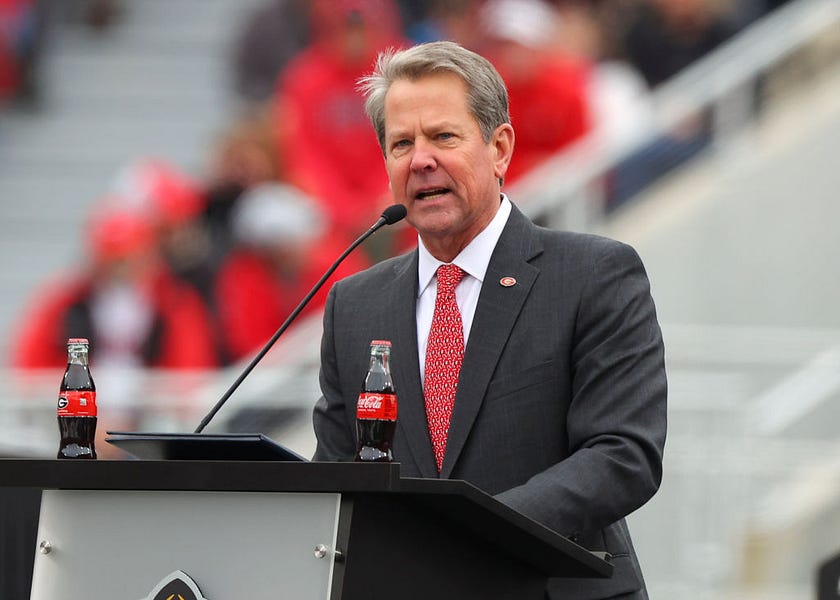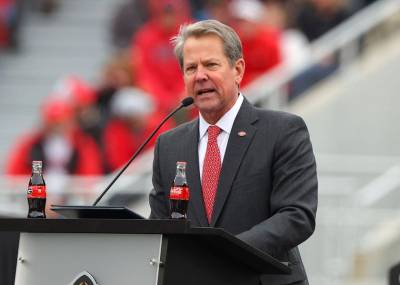Happy Monday! Declan is off this week, and both Steve and Andrew are working from out of town—keep us in your thoughts as we keep this TMD plane together for a few days with chewing gum and Elmer’s glue.
Quick Hits: Today’s Top Stories
Confirmation hearings begin this week for Ketanji Brown Jackson, President Joe Biden’s nominee to replace retiring justice Stephen Breyer on the Supreme Court. “When Judge Jackson’s hearings begin next week,” said Senate Majority Leader Chuck Schumer, “the American people will see for themselves precisely what senators are seeing right now: Judge Jackson is brilliant, she is beloved, and she belongs on the Supreme Court.”
Ukraine rejected a Russian demand over the weekend to surrender the strategically important city of Mariupol, where a humanitarian crisis is developing under constant Russian shelling and seige. Russian military officials said they would permit civilian evacuations out of the city Monday: “All who lay down their arms are guaranteed safe passage out of Mariupol.” Russia has previously broken ceasefires during the current conflict by bombing evacuation corridors, according to Ukrainian officials.
Ukrainian President Volodymyr Zelensky said Sunday that he remains willing to negotiate an end to the war with Russia’s Vladimir Putin, but that Ukraine would need “security guarantees, sovereignty, restoration of territorial integrity, [and] real guarantees for our country.” Zelensky also sparked controversy over the weekend by making an appeal to Israel that referenced the Holocaust: “Ukrainians made their choice. Eighty years ago, we saved Jews. The people of Israel, now you also have a choice.”
President Biden is traveling to Brussels this week for a Thursday NATO summit and a European Council meeting focused on the Ukraine conflict. Biden will also visit Poland to meet with President Andrzej Duda.
Justice Clarence Thomas was hospitalized Friday evening with “flu-like symptoms,” the Supreme Court said, with a spokesman telling CNN that he does not have COVID-19. “His symptoms are abating, he is resting comfortably, and he expects to be released from the hospital in a day or two,” the court said in a statement Sunday.
A Boeing 737 carrying 133 people crashed in the Chinese province of Gunagxi Monday, according to state media reports. The China Eastern Airlines plane went down near the city of Wuzhou, in southern China. “The flight that crashed appeared to be Flight No. MU5735 from Kunming to Guangzhou, according to data from flight-tracking website FlightRadar24,” the Associated Press reported. “It showed the Boeing 737-89P rapidly lost speed after 0620 GMT before entering a sharp descent.”
Can Brian Kemp Get out from Under Donald Trump?

Georgia Gov. Brian Kemp isn’t the sort of guy you’d expect to be fighting off a Republican primary challenge. He’s governed both as a pro-business maven of economic development and as a rock-ribbed social conservative, championing legislation like a ban on nearly all abortions after six weeks. His narrow victory over Democrat Stacey Abrams in 2018 looks even more impressive in hindsight, given the triple victory Democrats notched in the state just two years later.
But Kemp has found himself in Donald Trump’s crosshairs this year, thanks to the fact that he declined to throw his weight behind Trump’s effort to overturn Biden’s win in Georgia. Trump has endorsed former senator David Perdue against Kemp in a primary election that will take place in May, and which will be an early test of how long the former president’s reach remains when it comes to determining who can and can’t have a future in the GOP. Andrew’s covering the race and spent a few days down in the Peach State last week; he’s got a piece up on the site today overviewing the contest:
Brian Kemp isn’t a particularly stirring public speaker. His voice doesn’t rise above a conversational drawl as he reels through a stump speech that’s light on sweeping rhetoric and heavy on his policy record. Occasionally an ad-lib will meander off in some head-scratching direction, as with this digression in the middle of a critique of top-down COVID policymaking: “In other states, you had people that wouldn’t even give you the opportunity to fight through this. … I mean, we’ve literally seen one person take away liberties and freedoms in this country like we had never experienced before. And we’re watching what those kind of decisions end up with over in Russia and Ukraine right now. That is what we are fighting for.”
But where Kemp has always excelled on the trail, observers say, is in what comes before and after the speech: the hard work of retail politicking and relationship building in town after town, day after day, for weeks and months on end. In a book out this week called Flipped: How Georgia Turned Purple and Broke the Monopoly on Republican Power, Georgia reporter Greg Bluestein recalls how Kemp won his 2018 primary in large part thanks to “a personal touch that helped distinguish him from other politicians.” Bluestein recounts how Kemp would scan local newspapers every morning, “tapping out condolences to families he spotted in the obituary section of the Journal-Constitution and congratulatory notes to folks honored in the Walton County paper.”
“He made efforts to attend the funeral of every law enforcement officer killed in the line of duty, often appearing in the back pews of a church with no notice, and kept his calendar full of fish fries in Tifton and barbecues in LaGrange,” Bluestein writes. “Everywhere he went, even the most remote towns off dusty backroads, he seemed to have a friend willing to throw him a fundraiser—and then put him up for the night in a spare bedroom or on an air mattress.”
Still, extensive political relationships or no, conservative policy record or no, Trump’s breakup with Kemp over the 2020 election unquestionably hurt the governor’s standing among state Republicans. If the primary had taken place in May 2021 instead of May 2022, when anger over the election was still burning fresh in Republicans’ minds, he’d likely have been in real trouble.
But with Trump out of office and off Twitter, his messaging significantly diminished, it’s an open question how interested Republicans still are in using their votes to relitigate the 2020 election. “I wish Trump would stay out of the election—let them run the race by themselves,” said one Kemp supporter at the Richmond Hill event. His friend, who said he hadn’t decided which candidate to support, agreed: “In fact, I told Perdue last week when he was here in Savannah, he needs to put all his ads with Trump in the closet for a while and let’s just hear what he has to say.” (Both declined to give even their first names; they’re plenty friendly in southeast Georgia, but you don’t get the sense they like reporters much.)
A recent poll of Georgia GOP primary voters commissioned by the nonprofit Secure Democracy USA and conducted by GOP pollster American Viewpoint found that, while 88 percent of voters view Trump favorably, only 13 percent cited voting and elections as their top issue in deciding their primary vote.
Read the whole thing here.
Biden Warns China on its Chummy Relationship With Russia
For the first time since Russian forces launched an unprovoked attack on Ukraine last month, Biden and Chinese President Xi Jinping held a video call on Friday. The conversation between the two leaders, described by senior administration officials as “direct,” “substantive,” and “detailed,” lasted nearly two hours.
The question at hand: Does China plan to offer financial, military, or rhetorical support for Russian President Vladimir Putin’s war of aggression? Russia reportedly requested assistance from China this month, turning to its growing strategic partner for backing after facing fierce Ukrainian resistance and striking military losses in the early weeks of its invasion.
Biden “conveyed and described the implications and consequences if China provides material support to Russia,” White House Press Secretary Jen Psaki said afterward, though she stopped short of characterizing the U.S. position as a “warning.” A brief White House readout of the call afforded few additional details on either the specific content of the call or takeaways about the other side’s stance.
In contrast, the Chinese Foreign Ministry’s description of the discussion—published “before it was even done,” according to Psaki—gave a more than 1,000-word rundown of the back-and-forth. But the majority of China’s statement ignored the war in Ukraine entirely, focusing instead on perceived threats to the Indo-Pacific’s security architecture. Per the readout, the White House affirmed five key points central to U.S.-China relations: “Biden reiterated that the U.S. does not seek to have a new Cold War with China, to change China’s system, or to revitalize alliances against China, and that the U.S. does not support ‘Taiwan independence’ or intend to seek a conflict with China.”
A lengthy follow-up address by Chinese Vice Foreign Minister Le Yucheng on Saturday expanded on China’s warnings to the U.S., drawing a direct comparison between NATO enlargement and efforts by the U.S. to cultivate strategic partnerships in the Indo-Pacific. The trajectory of American engagement in the region, Le said, is “as dangerous” as NATO’s eastward expansion.
According to Patrick Cronin, the Asia-Pacific security chair at the Hudson Institute, the prevention of U.S.-led bloc-building in the Indo-Pacific has long been a central feature of China’s foreign policy. As other countries in the region grow increasingly aware of the threat posed by China, this objective becomes more urgent.
“The end goal is to block a counter-China coalition, or even more formally an alliance—a NATO in Asia, if you will,” Cronin told The Dispatch. “While the Quad nations of Australia, India, Japan, and the United States are primarily oriented toward a positive agenda for the Indo-Pacific, they’re increasingly concerned about potential insecurity, and they definitely share a common vision that China is the principal challenge to that. And that’s what Chinese policy is partly trying to thwart—that kind of alliance development in the Indo-Pacific.”
China’s goal dovetails nicely with Putin’s rhetorical attacks on American-led global institutions and alliances. The foreign ministry’s remarks on Saturday borrowed directly from the Russian president’s public statements casting NATO member states—primarily the U.S.—as the conflict in Ukraine’s primary instigators. “With the disintegration of the Soviet Union, NATO should have been consigned to history alongside the Warsaw Pact,” Le said, describing the alliance as a “Cold War vestige.” Statements from Chinese officials circulated via state media used similar language to reframe the conflict’s narrative to Russia’s benefit. The propaganda blitz followed a joint statement from China and Russia last month voicing public opposition to NATO’s eastward expansion.
But don’t expect China to openly declare its support for Russia—material or otherwise—any time soon. According to experts, Beijing hopes to project the public image of neutrality, even as it shifts blame for the war onto Washington and privately backs Moscow.
“China values its image as a country that refrains from meddling in the affairs of others. In the specific context of the Ukraine war, it has so far cultivated that very image, and it would be surprising if it opted to adopt a more partisan stance, especially to side with a country that is quickly becoming an international pariah,” Fred Rocafort, a legal expert on China and former diplomat, told The Dispatch. “Washington should continue to drive home the message that it will not forget how China acts during these critical days. It should remind China that, as fraught as the bilateral relationship is currently, there is room for it to get worse.”
One way China may provide covert assistance to Russia, experts say, is by helping Putin circumvent multinational sanctions—a skill in which Beijing is well-versed. But China is also expected to continue its push for a ceasefire talks between Moscow and Kyiv, both to protect its own economic interests in eastern Europe and to play the role of peacemaker on the international stage.
“[China’s] language and its actions since the war started suggest that it will continue to back Russia, but to do so with a wink and a nod more than a forthright partner,” Cronin said. “It won’t vote in favor of Russia when it’s being condemned by the General Assembly, but it will abstain. It won’t join the language of ‘invasion’ and ‘aggression’ that the West will want to place on Russia’s attack on Ukraine, but at the same time, it will talk about the need to end violence.”
“China will look for those opportunities to soften their image on this hard-edged reality of war in Ukraine that their close strategic partner is prosecuting,” he added. “But by not making a choice they’ve made one, which is to allow Russia the free hand that it wants to prosecute naked aggression against a sovereign state.”
Worth Your Time
In a piece for National Review, Kevin Wiliamson looks at the authoritarian temptation and our current moment. “You can take the word of the foreign caudillos themselves or listen to the slavering of their American admirers — the story is always the same: While liberal societies slide into softness and decadence, illiberal societies have the resolve to spurn cheap gratification, particularly in the form of consumerism and sexual license, in order to secure the genuine common good.” The problem? It’s not true. “Does Russia look strong today? Vladimir Putin’s thugs are pretty tough guys when the contest is, say, a five-on-one fight against an unarmed female journalist (Anna Politkovskaya) or when they’re quietly poisoning his critics with polonium-210 (Alexander Litvinenko), but they aren’t much in a real fight with Ukrainian patriots. Instead, they have been reduced to vulgar terrorism, bombing hospitals and residential buildings in an attempt to use atrocity as a substitute for victory. Meanwhile, Ukrainian farmers are towing abandoned Russian tanks around with tractors, taunting the cowards who left them behind.”
In the spring of 2019, in Santo Domingo, Dominican Republic, Boston Red Sox legend David Ortiz was shot shortly after arriving at a local bar. Ortiz was a larger-than-life figure in Boston and in his native country, and the shooting raised questions about his life in both places. In an in-depth investigation for Boston Magazine, Mike Damiano seeks answers to those questions and others in a piece worth reading even if you don’t care at all about baseball. “That frenzied quest for answers has yet to bear fruit, but it nevertheless opened a window into Ortiz’s personal life, offering a glimpse of him that had not always been visible to his legions of fans in Boston. Although Ortiz has always been unusually open and accessible to the public, and those traits are part of why Bostonians have grown to love him, there were some parts of his life—especially in the Dominican Republic—that he had long kept out of the spotlight. Consequently, the shooting didn’t merely reveal the two worlds Ortiz inhabited. It prompted the unraveling of his burgeoning attempts to finally bring them together for good.”
Something Beautiful
Presented Without Comment
Also Presented Without Comment
Toeing the Company Line
Over the weekend, we published our (now-annual, we guess?) watch guide for the Oscars’ Best Picture nominees. Swing by to see what Jonah has to say about Don’t Look Up, Sarah’s thoughts on West Side Story, Alec’s take on King Richard, and plenty more.
In his Friday G-File, Jonah takes aim at several instances of modern society’s “mismatch between words and things,” the result of “an age where the manipulation of words and images (another form of language) is intertwined with politics, culture, class, and economics in ways we’ve never seen before.” Meanwhile, on the latest solo Remnant, Jonah chews over Ukraine, whether populism is falling out of style, and Woodrow Wilson.
David’s Sunday French Press attempts to chart a path toward how society should approach people like Lia Thomas—the transgender swimmer who just won the women’s 500-yard freestyle NCAA championship. “In the vast majority of life circumstances, I do not believe that a trans person should face discrimination because they are trans,” David writes. “But there are limited circumstances where biological realities mean that some distinctions are not only wise, they protect other classes of Americans from both unfairness and intrusion on their rights.”
The latest Dispatch Podcast tackles the Biden administration’s attempt to strike a deal on Iran’s nuclear program, as well as Biden’s foreign policy writ large. Sarah, David, Steve, and Jonah then go on to discuss inflation and the Federal Reserve’s attempt to curb it by cranking interest rates.
Let Us Know
An exciting and upset-filled weekend in the NCAA tournament caused several Dispatch writers and editors to give up hope on their NCAA pools. Did you watch any games? Do you have a favorite moment? Is there any hope for your pool?
Reporting by Andrew Egger (@EggerDC), Charlotte Lawson (@lawsonreports), and Steve Hayes (@stephenfhayes).







Please note that we at The Dispatch hold ourselves, our work, and our commenters to a higher standard than other places on the internet. We welcome comments that foster genuine debate or discussion—including comments critical of us or our work—but responses that include ad hominem attacks on fellow Dispatch members or are intended to stoke fear and anger may be moderated.
With your membership, you only have the ability to comment on The Morning Dispatch articles. Consider upgrading to join the conversation everywhere.